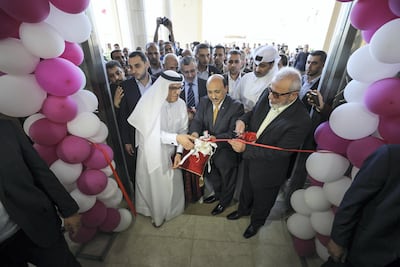Gaza inaugurated an $11 million Qatari-funded court complex on Sunday. But while Qatar’s ambassador to Palestine received polite applause as he cut the ribbon on the new Justice Palace, many Gazans were seething.
The judicial complex, which includes three limestone-clad seven-storey buildings built on an 11,000 square metre section in the former Israeli settlement of Netzarim south of Gaza City, was "a generous gift," which would mark a milestone in bilateral relations "for generations to come", according to the head of Gaza's Supreme Judicial Council, Abdul Raouf Al-Halabi.
But in a besieged enclave where nearly 80 per cent of the population depends on donor aid and youth unemployment is over 60 per cent, critics asked whether the money might have been better spent elsewhere.
"Gazans would have felt more justice if the building's budget was given to labourers and university graduates to start small-scale businesses," Al Aqsa University Islamic history lecturer Hani al-Jazzar told The National.

An estimated 96,000 homes in Gaza were destroyed and damaged during the 2014 war with Israel and due to the ongoing blockade, thousands are yet to be repaired. The conditions of Gazans living in these damaged apartments drew stark comparisons with the opulence of the new courthouse.
“Hundreds of families sleep on the cold floor and cannot provide for themselves,” wrote Mohammed Hassna, former Director of the Organisation of Islamic Cooperation in Palestine, while “the Justice Palace is being prioritised in a place where justice is largely absent.”
The building was unlikely to service ordinary Gazans, he said, and could well become a target if hostilities with Israel resume. "This extravagant construction will be inevitably destroyed in the next war.”
Proponents insist the Justice Palace while help strengthen the judiciary in the enclave, while Hamas officials have promoted it as a manifestation of Palestinian sovereignty. Independent good governance consultant Mamoun Besaiso called it an “utmost necessity”.
But given that Gaza functions under an Israeli blockade, which the United Nations warns could render the strip unlivable by 2020, some Palestinians questioned how the Justice Palace would advance their sovereignty. "The Justice Palace is only a further consolidation of a multi-layered tyranny and oppression," said Anas Ahmed, a 34-year-old project coordinator at a local organisation. "Justice doesn't need an architectural folly… justice could be achieved in a tent."
_______________
Read more:
In this hospital, Palestinians' healthcare may feel brunt of Donald Trump's cuts
Palestinians file ICC war crimes complaint over Israeli demolition plans
_______________
Other Gazans were quick to highlight an apparent double-standard. Hamas supporters praised the construction of the Justice Palace but just two years ago Hamas criticised the construction of an equally costly presidential palace in the West Bank city of Ramallah.
Perhaps surprised by the backlash on social media, Hamas supporters responded on Monday by pointing out that looking a gift horse in the mouth was unseemly at a time where donors are pulling funding for Palestinian causes.
"The justice palace was approved, funded and supervised by Qatar four years ago,” said Hamas researcher Khalid Hanyia. “Is it reasonable that a state generously donates to build a sovereign construction for the judicial authority and then we ask it to stop the project because the conditions of Gaza have become worse?"

